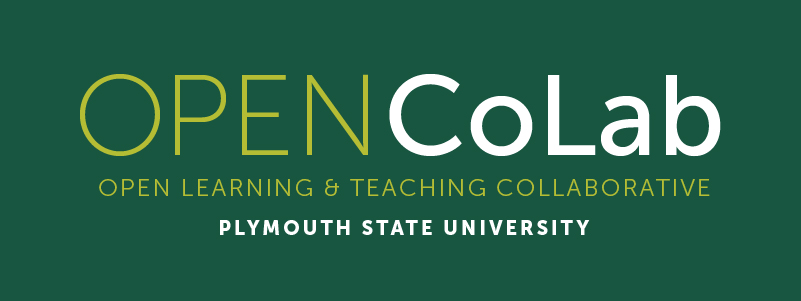“In an exam-based course, you know what you want to get out of every class and what you want to get out of the exam,” says Professor Abby Goode. “This is a different scenario.”
The syllabus for American Food Issues: From Fast Food Nation to Farm Stands, clearly states the significance of self-directed learning. Goode tells students upfront, “The most important aspect of this course is that it will focus on your ideas about how to respond to complex challenges and develop a healthy, sustainable, equitable, and thriving food culture,” and that a key learning outcome is, “You will contribute to this course and to the field in ways that I, the professor, could not have anticipated at the beginning of the semester.”
“I’m shaping and molding the course arc but I don’t have complete control,” says Goode. “This is an incredible group of students and it’s been a joy so far.”
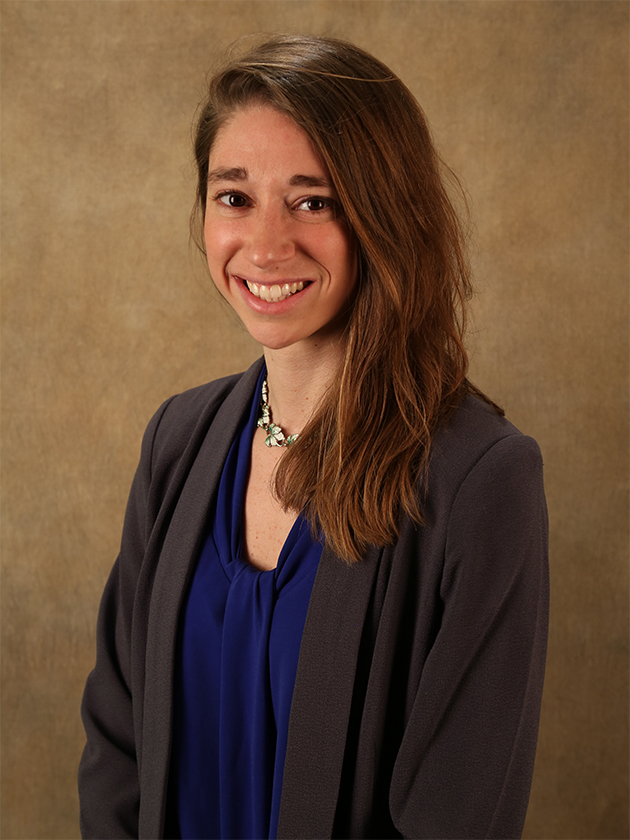
Professor Abby Goode
As Plymouth State University becomes more fully aligned with Integrated Clusters, new “Cluster Pedagogy” methods for delivering and acquiring knowledge are transforming curricula, faculty opportunities, and student engagement.
New ways of engaging students and faculty
PSU’s pioneering learning model received a big vote of confidence in late 2018 from the Trustees of the Davis Educational Foundation, which awarded the University a $214,632 grant for “Implementing Cluster Pedagogy in the General Education Program.” The trustees praised the initiative “…as a bold approach to reimagining the University’s structure and student experience.”
The foundations of Cluster Pedagogy include interdisciplinarity and integration; project-based work that extends beyond the walls of the classroom; and open practices that foster access to knowledge and empower students to contribute to their wider communities and networks. Professor Cathie LeBlanc, coordinator of the General Education Program, notes, “Students work on projects that impact the world in some way. By engaging in multiple open educational experiences created by Cluster Pedagogy, they are prepared for success after graduation.”
Professor Robin DeRosa is recognized nationally for her expertise in Open Pedagogy, or the practice of engaging with students as creators of information rather than simply as consumers. “It’s about reducing barriers to education, empowering learners, and connecting the academy to the world that it serves,” she says. Cluster Pedagogy is PSU’s exclusive formulation of Open Pedagogy, and DeRosa and LeBlanc are designing it to be a more systemic approach that uniquely takes advantage of the Four Tools of Integrated Clusters.
PSU’s three main areas of institutional focus for Cluster Pedagogy are interdisciplinary, open, and project-based learning. A new initiative headed by DeRosa, the Open Learning & Teaching Collaborative (Open CoLab), is helping faculty and staff share their expertise in engaged pedagogy with each other, and expand and innovate their practices to meet the needs of twenty-first century learners.
Examples include an education professor seeking to create openly licensed materials for teacher certification processes (to enable new educators to more easily share their best practices); a business professor who has graphically sketched out the processes universal to business startups that he now wants made more accessible; and a group from the business, chemistry, and environmental studies departments who want to promote their new cross-Cluster collaboration. DeRosa is helping all align what they’re doing and interested in with PSU’s new academic direction. “The CoLab is booked solid with meetings and faculty are fired up with good ideas,” she says. “It’s pretty exciting.”
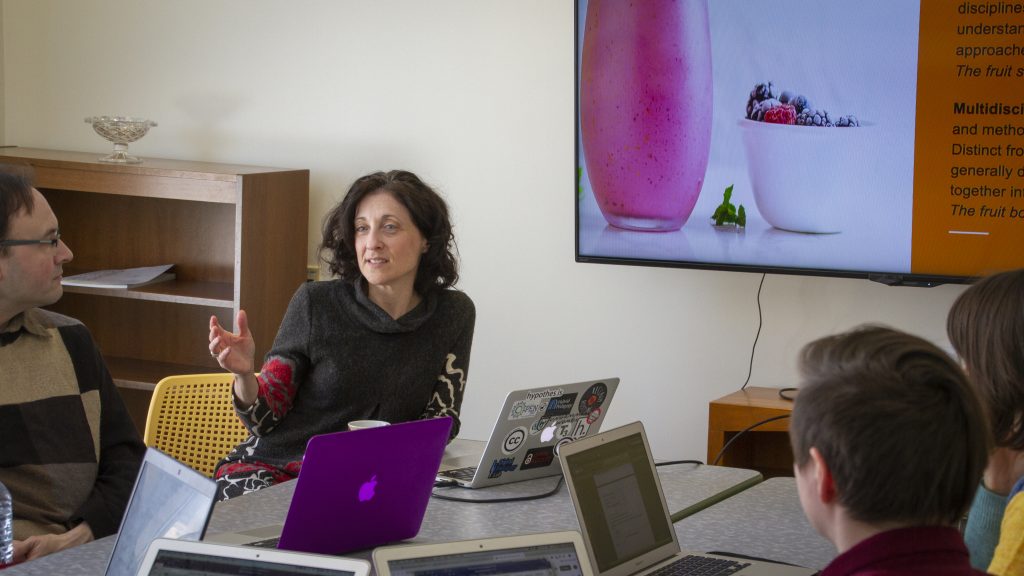
Robin DeRosa meeting with faculty members in the new OpenCoLab.
First-Year Seminar transitions to “Tackling a Wicked Problem”
In December, over 1,000 students shared the work they completed in their First-Year Seminars, addressing the “wicked problems” that face our world. The Bank of New Hampshire Field House was abuzz with posters, presentations, and research on topics ranging from homelessness and climate change to racism and food insecurity.
Students took on what often seem like unsolvable problems and applied their own life experience, empathy, and critical thinking to explore solutions and, most importantly, apply what they learn in the class. “This work is what our world needs, and our students are the future leaders who will address these challenges,” says President Donald Birx.
The seminar has been the first of the “Four Tools” of Integrated Clusters, and it has evolved over the last two years to keep pace with the deepened implementation of Clusters overall. With the benefit of lessons learned, Plymouth State is rolling out a new course for first-year and transfer students. “Tackling a Wicked Problem” will replace the seminar next fall, representing a critical step in Cluster Pedagogy development.
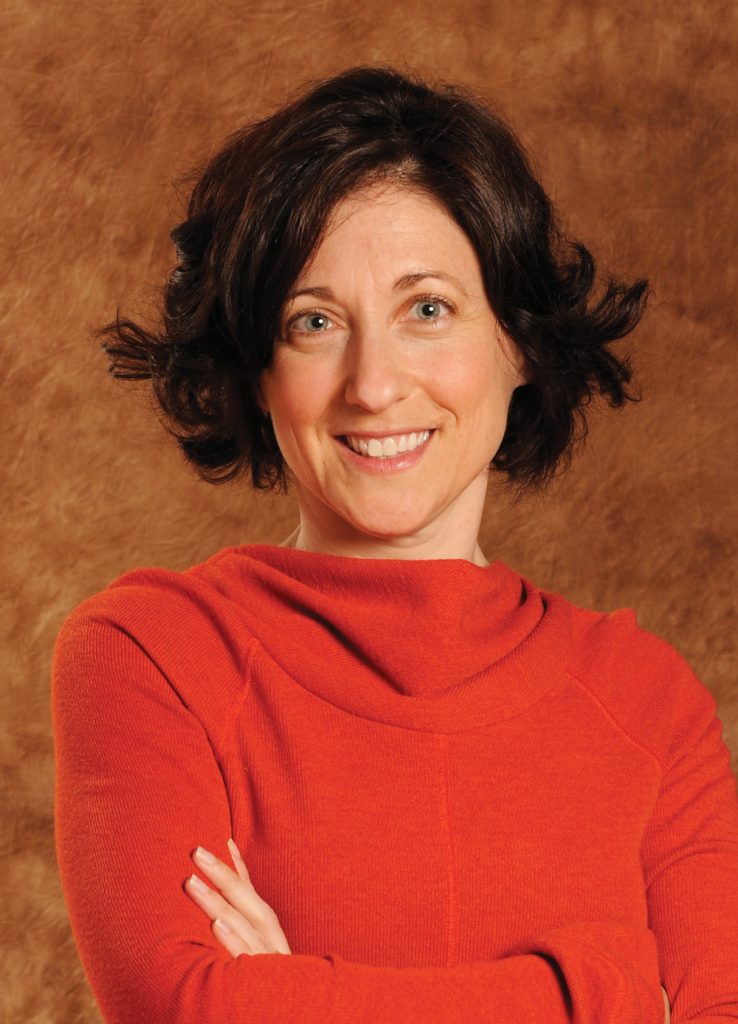
Professor Robin DeRosa
A significant change is “Tackling’s” emphasis on the process of learning, as opposed to the seminar’s on learning content. “There was a sense that the First-Year Seminar had body of content that had to be transmitted to equip students for college learning,” says DeRosa. “Instead, learners need to enter a process so they can equip themselves to make lifelong learning possible. We’re thinking of learning as a process of engagement rather than as a transaction.”
DeRosa cites a report about the “shelf life” of disciplines, with the content knowledge of computer science, for example, quickly becoming obsolete due to rapid advances in the field. “Yet learning how to think and navigate as a computer scientist is incredibly important,” she observes.
The General Education Program’s learning outcomes stress acquisition of twenty-first century “Habits of Mind”—ways of thinking or engaging with the world. The four habits (Purposeful Communication, Problem Solving, Integrated Perspective, and Self-Regulated Learning) are developed in meaningful contexts through PSU courses and experiences.
“The new Tackling a Wicked Problem course will give students the opportunity to work on those Habits of Mind, which employers have indicated are really important to them and that we maintain will help students be successful in all aspects of their lives, not just in their employment,” says LeBlanc. “It will give students a foundation for Cluster Pedagogy. Students will work in interdisciplinary teams on projects that they can take ownership of, and the course will extend beyond the walls of the classroom so that their work either lives on in time, or the result of their work has an impact in some way in the world.”
Students take ownership of “Signature” projects
The Association of American Colleges & Universities has urged institutions of higher education to prepare students to pursue their own “signature work”—projects related to a problem important to the student and to society. PSU’s Integrated Capstone (INCAP) courses provide juniors and seniors with this personal achievement that will propel them into the working world.
Goode’s student-driven course is one INCAP example, and LeBlanc is currently piloting another. PSU’s supportive culture and innovative educational model sets the University apart from other institutions, and her students are brainstorming new online and face-to-face experiences to better introduce these strongpoints. They have interviewed Admissions and Student Success Program staff and analyzed messaging sent to prospective and admitted students, along with that associated with Open Houses, Registration, Panther Days, and other events. “They are looking at what we currently do and thinking about where we might be interested in redesigning things, and coming up with new experiences,” she says.
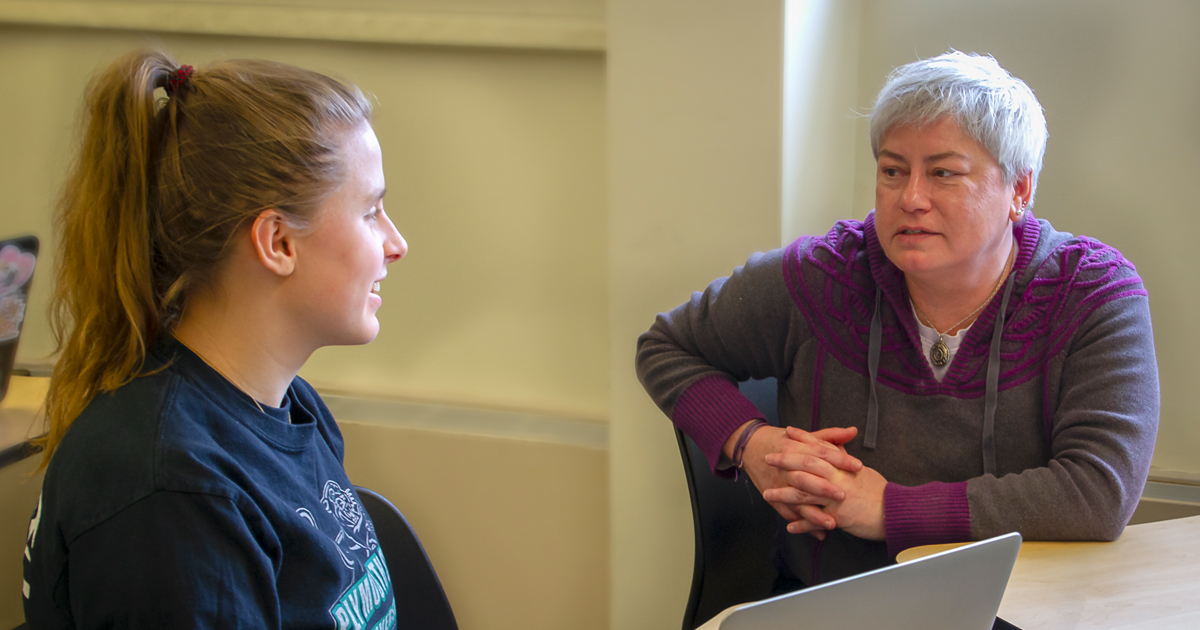
Professor Cathie Leblanc working with Megan Toman, a junior in the Communications and Media Studies major.
Professional Development in Cluster Pedagogy
Faculty are being introduced to many new opportunities presented by Cluster Pedagogy through the Open CoLab, which is helping to develop common campus vocabularies and presenting key research; providing diverse examples from PSU and beyond; sharing current challenges and problems; and offering strategic plans for next steps.
“It’s focused on praxis: the linking of theories, ideas, and research about pedagogy with actual teaching practice,” says DeRosa.
The Davis grant is supporting professional development in Cluster Pedagogy, and faculty are invited to engage in the new Cluster Pedagogy Learning Community, comprised of teacher-scholars sharing a baseline of knowledge and experiences. DeRosa and LeBlanc are currently refining the community’s curriculum, which will feature readings, group meetings, and reflective practice groups. “Faculty participants will be teaching a wide variety of classes within the General Education program as well as in courses based in majors,” says LeBlanc.
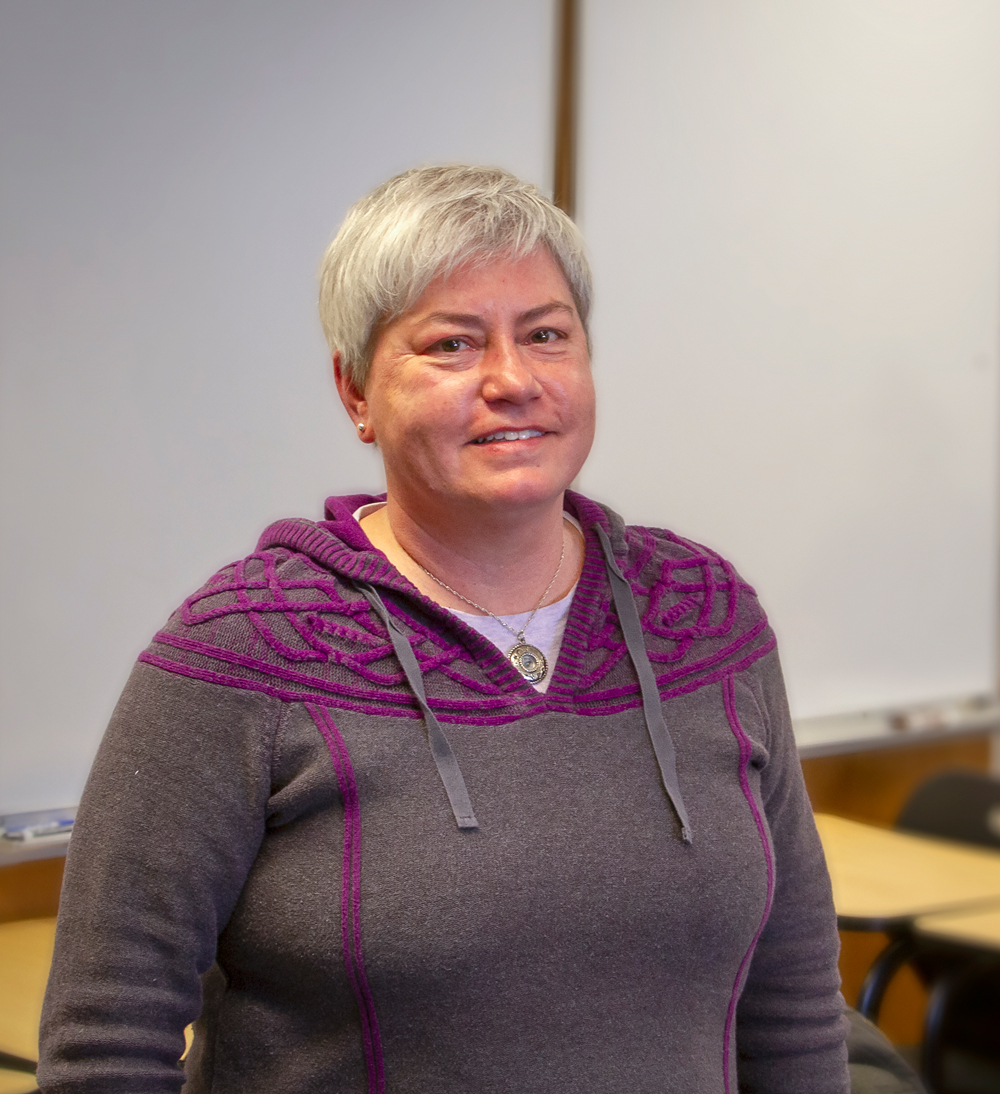
Professor Cathie Leblanc
“Students work on projects that impact the world in some way. By engaging in multiple open educational experiences created by Cluster Pedagogy, they are prepared for success after graduation.”
– Cathie Leblanc
The Davis grant will provide stipends for 50 faculty annually for the next two years to participate in the learning community, and an additional 10 faculty will be supported annually by the USNH Academic Technology Institute.
Extending Cluster benefits throughout the University
LeBlanc emphasizes that students in the new “Tackling” course won’t be expected to “solve” Wicked Problems, but rather to learn about them and devise scaled solutions. For example, a class might learn about homelessness and then mount a clothing drive to aid a local shelter.
The connection to the General Education Program is key to what makes PSU’s changes so groundbreaking. “What we’re doing here is different than what other colleges and universities are attempting because we’re making these changes in our Gen Ed Program, which means every student is going to get these experiences, not just those in an Honors Program or other limited-enrollment program,” says LeBlanc. “To me, that equity issue is huge.”
The benefits of Integrated Clusters are extending throughout all aspects of the Plymouth State experience via new courses, curricula, and faculty insights. Keep your eyes on PSU; the University is very much a work in progress, and the pace of progress is quickening. ■ Peter Lee Miller





